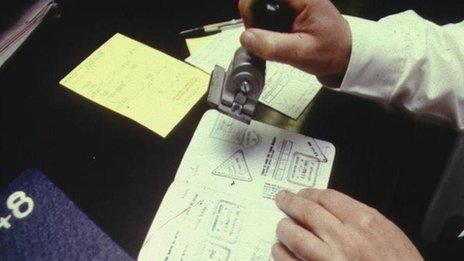UK immigration acts through the ages
- Published

The government has published its Immigration Bill, which will change the rules on access to the NHS and impose tougher penalties for illegal working. But what legislation has been passed over the last century or so?
Aliens Act 1905
This targeted "undesirable aliens" - such as paupers, lunatics, vagrants and prostitutes - who could be refused entry.
British Nationality and Status of Aliens Act 1914
This granted the common status of British subject upon those persons who had specified connections with the Crown's dominions.
British Nationality Act 1948
The Empire's dominions each adopted their separate citizenships, but retained the common status of British subject.
Commonwealth Immigrants Act 1968
This required certain potential migrants to supply proof that either they, their parents or grandparents had been born in Britain.
Immigration Act 1971
Commonwealth citizens lost their automatic right to remain in the UK, meaning they faced the same restrictions as those from elsewhere. They would in future only be allowed to remain in UK after they had lived and worked here for five years.
A partial "right of abode" was introduced, lifting all restrictions on immigrants with a direct personal or ancestral connection with Britain.
Immigration Act 1988
This act ensured that only one wife or widow of a polygamous marriage had a right to enter the country.
It also ensured people with freedom of movement in the European Community did not need leave to enter or remain in the UK.
Asylum and Immigration Act 1996
It became a criminal offence to employ anyone unless they had permission to live and work in the UK.
Immigration and Asylum Act 1999
The act removed benefits from asylum seekers and created the National Asylum Service to house them, taking pressure off local authorities.
Nationality, Immigration and Asylum Act 2002
This created the first English test and citizenship exam for immigrants and introduced measures against bogus marriages.
Asylum and Immigration Act 2004
This act introduced a single form of appeal that remains to this day and made it a criminal offence to destroy travel documents. It limited access to support for those told to leave the UK.
Immigration, Asylum and Nationality Act 2006
A five-tier points system for awarding entry visas was created.
Those refused work or study visas had their rights of appeal limited.
The act brought in on-the-spot fines of £2,000, payable by employers for each illegal employee, which could include parents taking on nannies without visas.
UK Borders Act 2007
This provided the UK Border Agency with powers to tackle illegal working and automatically deport some foreign nationals imprisoned for specific offences, or for more than one year.
It gave immigration officers police-like powers, such as increased detention and a search-and-entry roles.
The act brought in the power to create compulsory biometric cards for non-EU immigrants.
Borders, Citizenship and Immigration Act 2009
This act amended the rules so people from outside the European Economic Area had to have residential status for eight years before being eligible for naturalisation.
Those seeking naturalisation through wedlock had to be married for five years first.
The act also allowed immigration and customs officers to perform some of each other's roles and imposed a duty on home secretaries to safeguard children.